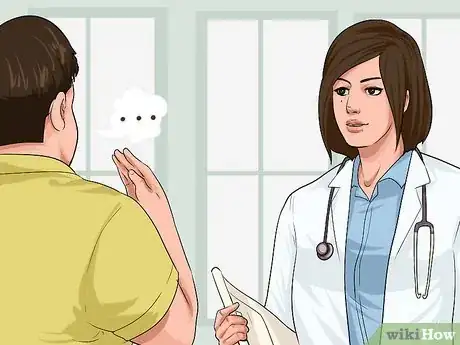This article was co-authored by Trudi Griffin, LPC, MS. Trudi Griffin is a Licensed Professional Counselor in Wisconsin specializing in Addictions and Mental Health. She provides therapy to people who struggle with addictions, mental health, and trauma in community health settings and private practice. She received her MS in Clinical Mental Health Counseling from Marquette University in 2011.
There are 9 references cited in this article, which can be found at the bottom of the page.
This article has been viewed 19,937 times.
Psychologists and psychiatrists do many of the same things, but there are also key differences in training and treatment that may help you to make a decision. Although both types of professionals are highly trained, you may find that one type of mental health professional is better suited to meet your needs than the other. By considering the training differences and treatment types available from each type of professional, you can make an informed decision about your treatment.
Steps
Considering the Differences
-
1Learn about the differences between the professions. Psychiatrists and psychologists are both mental health professionals who diagnose, prevent, and treat mental disorders like anxiety and depression. Psychologists use psychotherapy to treat mental illness, while psychiatrists are medical doctors who prescribe psychotropic drugs to help manage mental illness.
- Psychologists have a doctorate in Psychology (either a Ph.D. or a PsyD.) which usually includes lessons on human behavior, ethics, research, and making psychological assessments which usually takes 4-8 years to complete. They cannot prescribe medicine.
- Psychiatrists are physicians who specialize in mental health. They must have a medical degree (MD or DO) and complete residency where they learn to diagnose and treat mental illness. They are qualified to prescribe medicine.
- For more severe disorders like major depression, bipolar disorder, or schizophrenia, it is better to see a psychiatrist because you may need medicine to help manage your symptoms. Psychologists may turn their patients over to a psychiatrist if they believe the patient may better benefit from medicine (which can change the brain chemicals).
-
2Consider the types of treatment offered. Psychologists and psychiatrists can also take different approaches to the treatment of mental health issues. Due to their training, psychologists mainly offer psychological analysis and counseling. Since psychiatrists train as medical doctors first, they can also order blood tests and complete physical exams to connect mental health issues with biological problems.[1]
- Psychologists use techniques like cognitive behavioral therapy to help patients cope with problems and to overcome mental health issues.
- Psychologists can also provide psychological assessments.
- They may look into your sleep patterns, your eating habits, and other aspects of your life to pinpoint the problem.
- Psychiatrists look at your mental state but also your physical health.
- They may order tests to determine whether your symptoms are related to underlying physical conditions.
Advertisement -
3Decide if you want medication therapy. One of the major differences between psychiatrists and psychologists is that psychiatrists can prescribe medication, like antidepressants, antipsychotics, sedatives, and mood stabilizers.[2] For example, a psychiatrist can treat depression with talk therapy alongside tests to see whether there is a physical issue, such as a thyroid problem, that may be causing your symptoms.
- A psychiatrist may prescribe a medication that will treat your specific condition.
- For example, a psychiatrist may prescribe antidepressants to treat depression, Ritalin for Attention Deficit/Hyperactivity Disorder, or antipsychotic medications for hallucinations.
- Psychiatrists, in the same way, can order medical tests and therapies that aren’t available to psychologists.
- For instance, they can use electro-convulsive therapy (ECT) for conditions like severe depression, mania, and catatonia.
- Psychologists rely mostly on talk and behavioral therapy to help you come to terms with issues and to cope.
- They are not normally licensed to prescribe medicine, but psychologists in Louisiana, New Mexico, and Illinois who have received the appropriate pharmacological training are permitted to prescribe certain medications.[3]
-
4Plan on going through talk therapy. Psychologists and psychiatrists can use talk therapy, but psychologists may rely on this treatment method more since medication is not usually part of the treatment options that they offer. Talk therapy can be quite effective and some people seem to prefer counseling to other treatment options.[4]
- Therapy has also been found to be as effective as medications in some situations, but medication may still be necessary in conjunction with talk therapy.[5]
- Therefore, if you choose to see a psychiatrist, then you may need to see a therapist in addition to seeing a psychiatrist.
- Some psychiatrists operate medication only practices, while others offer medication and talk therapy.
- If the psychiatrist you are considering offers medication only, then you will need to seek talk therapy from a different mental health professional.
- If the psychiatrist offers medication and talk therapy, then you can see the psychiatrist for talk therapy.
- Keep in mind that talk therapy is essential because even though medication can be helpful, medication alone is not enough to change the way you deal with your emotions.[6]
- Talk therapy can allow you resolve conflicts with loved ones or a spouse, work through anxiety, relieve stress, cope with major changes in life, manage unhealthy behavior like anger, or deal with sexual problems.
- Many people also prefer talk therapy with a psychologist to medicine and a psychiatrist’s “pharmacologic” treatment.
- This may be because they fear becoming addicted to meds or don’t want to change their brain chemistry.
Making an Appointment
-
1Talk to your doctor. Talk to your primary care doctor about whether a psychologist or psychiatrist is right for you. There are some important considerations to make, including what kind of mental health issue you’re facing, what sort of treatment is available, and what sort of treatment you prefer. Your doctor can help you make an informed decision.
- You may also need a referral from your doctor to see a mental health professional.[7] Check with your health insurance to determine what the requirements are.
-
2Weigh the pros and cons of insurance and access. Many insurance plans now cover psychological and psychiatric services and must, by law, treat them on equal footing with other medical coverage. However, that doesn’t mean that insurance will cover your visits, and they may only cover a certain number of visits per year. You’ll need to check your coverage before making a final decision.[8]
- Legally, insurance companies can’t charge you higher co-pays for mental health services than for medical services. However, they can limit your ability to access psychologists and psychiatrists in other ways.
- Many insurance companies haven’t increased payment rates for psychologists and psychiatrists in 10 to 20 years, or have even cut them.
- This means that many networks have trouble attracting mental health specialists.
- You may, therefore, have to pay more out of pocket and then claim the visit as an “out-of-network service.”
- Insurance companies can also make you get “prior authorization” before accessing psychiatric services like inpatient treatment, even in emergencies like having suicidal thoughts.
- The doctor will have to get this from the insurer before you can be admitted as a patient.
- Make sure to talk to your doctors as well as your insurer to see what services are covered, how you can access them, and what the potential costs are.
-
3Ask questions. When you call to make your first appointment, you can ask questions about the psychiatrist or psychologist’s experience and area of expertise to help you make your decision. For example, you might ask:[9]
- How long have you been practicing?
- I have been struggling with ___. Is this something that you have experience treating? What types of treatment do you use?
- How much do you charge for each session?
- Do you accept my insurance?
References
- ↑ https://www.psychiatry.org/patients-families/what-is-psychiatry
- ↑ http://www.mayoclinic.org/diseases-conditions/mental-illness/in-depth/mental-health-providers/art-20045530
- ↑ http://www.apa.org/helpcenter/about-psychologists.aspx
- ↑ http://www.ncbi.nlm.nih.gov/pubmed/23842011
- ↑ http://www.mayoclinic.org/tests-procedures/psychotherapy/details/why-its-done/icc-20197191
- ↑ http://www.goodtherapy.org/drugs/psychotropic-medication.html
- ↑ https://www.unitedhealthcareonline.com/ccmcontent/ProviderII/UHC/en-US/Assets/ProviderStaticFiles/ProviderStaticFilesPdf/Referral_Requirements_Quick_Reference.pdf
- ↑ https://www.psychologytoday.com/blog/almost-addicted/201411/why-is-it-so-hard-see-psychiatrist
- ↑ http://www.apa.org/helpcenter/choose-therapist.aspx



























































Medical Disclaimer
The content of this article is not intended to be a substitute for professional medical advice, examination, diagnosis, or treatment. You should always contact your doctor or other qualified healthcare professional before starting, changing, or stopping any kind of health treatment.
Read More...